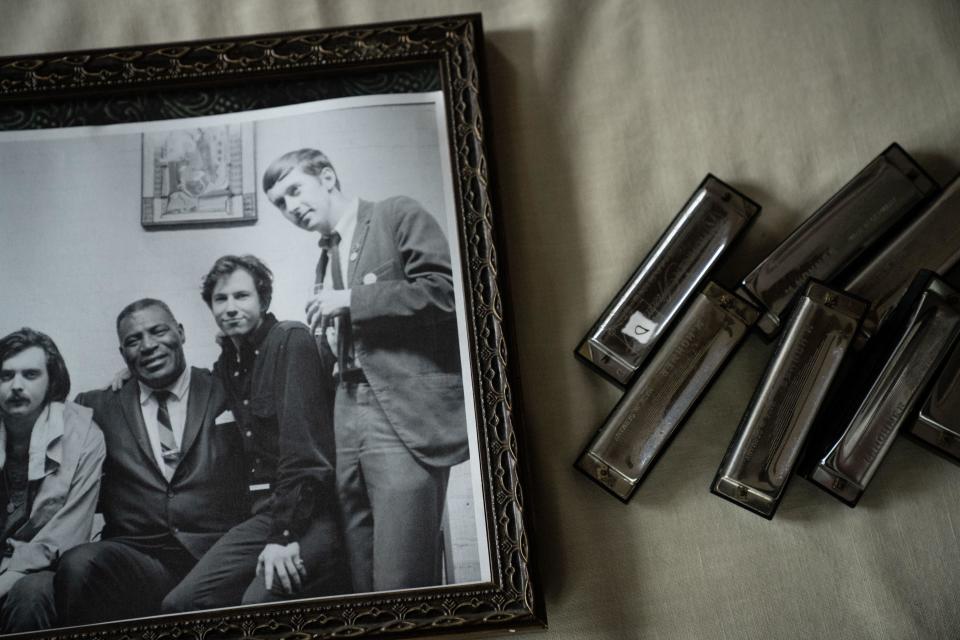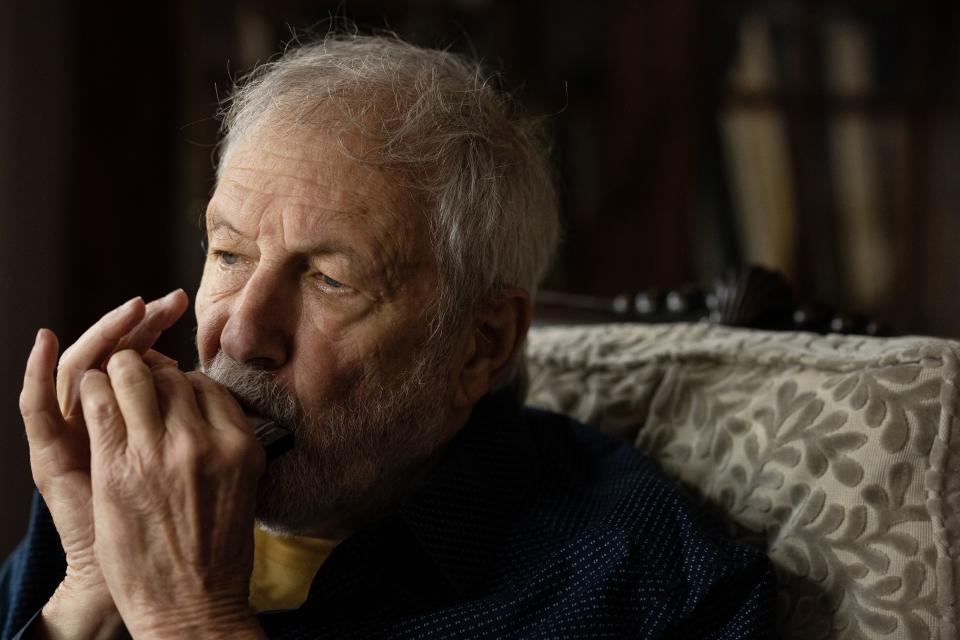There’ll be no singing the blues when Corky Siegel turns — can you believe it? — 80
- Oops!Something went wrong.Please try again later.
- Oops!Something went wrong.Please try again later.
- Oops!Something went wrong.Please try again later.
Corky is a kid’s name and the only Corky I have ever known has ever been childlike in his energy, enthusiasm and worldview.
My Corky may actually be your Corky too, because Corky Siegel has been a part of the local and international music scene for a long time, and counting.
As his 80th birthday arrives in a few days, on Oct. 24, it comes with a couple of concerts, at City Winery with his Chamber Blues on Oct. 22 and as a solo performer Nov. 11 at the Acorn Theater in Three Oaks, Michigan.
In the face of this calendar landmark, it’s impossible to resist the pull of memory, some of the particulars of the past.
Mark Paul “Corky” Siegel is a child of the South Side who first heard the blues on the radio in his home and on some 45 rpm records given to him by his sister and an uncle who ran a Tastee-Freez on 63rd Street and Stony Island Avenue.
Though he was grabbed by some of the exciting rock ‘n’ roll sounds of the time — Elvis, Chuck Berry et al. — and played saxophone for a time as a teenager, he was increasingly drawn to the blues and the harmonica. He found a similarly inclined young man when he met guitar-playing Jim Schwall in an elevator when both were students at Roosevelt University.
The pair drove around looking for music clubs in neighborhoods on the South and West Sides. They were, of course, looking for places that featured the blues. But they were after something more. “We had been told by our parents that America was a country that treated its Black people justly,” Siegel told me. “We looked out our windows and saw unbearable injustice. I think we wanted to be part of that culture, not only because we loved it but because we wanted to be on the side of what was good and right.”
In 1965, near the corner of 43rd Street and Vincennes Avenue, the pair found Pepper’s Show Lounge. They walked in and asked the owner, Johnny Pepper, if they could play. He said, “OK but you have to audition.” They did so, for the handful of customers in the club.
“I had only been playing the blues for less than a year so I was a beginner and to some extent so was Jim,” Siegel said.
But Pepper hired them as the Thursday night house band, playing from 9 p.m. to 3 a.m. They were usually joined on stage by a blues who’s-who, such giants as Little Walter, Willie Dixon, Hound Dog Taylor, Howlin’ Wolf, Otis Spann, James Cotton, Junior Wells, Lefty Diz, Buddy Guy, Magic Slim and Muddy Waters.
Decades later Siegel said, “It was magic. I owe my whole musical life to this experience and to those blues masters and to Johnny Pepper who had an open mind to have us beginners get up on that stage night after night.” They formed the Siegel-Schwall Band and played such clubs as the Quiet Knight and Big John’s; traveled the country and shared billings with Janis Joplin and Joni Mitchell; recorded studio and live albums; were the first blues band to ever perform with a symphony, playing “Three Pieces for Blues Band and Symphony Orchestra” with the San Francisco Symphony and elsewhere. Billboard magazine called them “one of the best acts in America” but in 1974, without trouble or anger, they broke up.
They would reunite every once in a great while over the years as Schwall moved to a relatively quiet life in Wisconsin and Siegel kept at it. He played clubs as a solo act, played keyboards and harmonica on albums by John Prine and Steve Goodman, and played with major symphony orchestras here and in Europe. He would become a member of the Chicago Blues Hall of Fame and be acknowledged as one of the world’s greatest harmonica players. Much of his creative time was spent with Chamber Blues, a compelling and wildly entertaining group he created, a vibrant blending of classical music and blues.
Along this road, he never forgot the beginning, telling me, “It all started with, would never have happened without Pepper’s. It has become clear to me how fortunate it was for me to be able to be on stage every week with these blues masters coming and going all night long. When I am composing and/or performing with symphonies or chamber groups, I feel that strong connection from Pepper’s. It’s the fuel behind everything I do.”
When you live long enough there is a list of loss, and Siegel has a long one, a list of such friends and collaborators that includes Goodman, Prine, Sam Lay, Ernie Watts, and most all of the bluesmen who sparked and nurtured his career and enriched his life.
Jim Schwall died in 2022, at which time Siegel told me, “I realized that in the 60 years we had known each other, played music together, there had only been two disagreements, and each of those lasted one minute. I made it a point to tell him in some of our final conversations how much I loved him and how important he had been to me.”
I don’t know what special things Siegel’s wife Holly is planning for this birthday celebration. Let it be a surprise. But I did ask Corky how he feels about it.
He said: “I think the title of my memoir will be ‘My Memory is a Thing of the Past, the Future is an Unopened Present.’ That’s how I feel about turning 80.
“When the people at the drugstore or the doctor’s office ask me my birthdate, I always say, ‘Wow, that was so long ago. Let me grab my Rolodex.’ I’ll also share my experience that my body has always followed my every command throughout my life and now it’s beginning to protest a little.
“One thing I can say with all that is going on in this world — and it only took me 80 years to realize — is that there is only one meaningful reason to be alive on this planet and that’s to bring only good and kindness into this world with every action, thought and breath.”
Well, that’s my Corky. Happy, happy.
Corky Siegel’s Chamber Blues plays 7 p.m. Oct. 22 at City Winery Chicago, 1200 W. Randolph St.; tickets $35-$48 at 312-733-9463 and citywinery.com


